Juncker's 2025 Vision for Europe
With his State of the European Union speech today at the European Parliament, Jean-Claude Juncker, the President of the European Commission, has sought to remind us all
of the indispensable role of the European Commission as the unifier and
pacifier of the European project. It was a remarkable speech that was quite
visionary in some of the proposals that Juncker made.
He sought simultaneously to put the accent on the European construct by stating his intention to defend his office and be part of the triumvirate together with Merkel and Macron that will lead to process of transformation (in other words, he sends the message that Merkel and Macron cannot and should not lead alone). His “all together” approach is bound to win him friends among the small and very small states that comprise the the bulk of the Union's member states that are concerned by the multispeed preferences of some of the bigger states. He also reminds small states that the attempts by some of them to disrupt the European project will fail – hence the stress of migration and Europe as a continent of dignity and solidarity. In his ‘federal vision’ for Europe, Juncker also caters to the European Parliament (EP) and its important role which he does not want diluted with proposals in favour of a separate chamber to deal with Eurozone issues.
Likewise, while he acknowledges
the merits of Macron’s call for an EU Finance Minister, he suggests that this
need not be a separate office but one within the Commission (hence the 'Community method' applies with oversight from the EP). He further nods to the EP with the emphasis on a more democratic Europe and the need for
transnational lists for future European elections.
His proposal for the single post of the
President of the Commission and the President of the European Council is also
far reaching and a snub to
the perennial tug of war between the national capitals and the European
institutions yet it also acknowledges that if a more federal EU is to be
constructed, then a double hatting approach needs to be applied much as is the case
with the High Representative of the Union for Foreign Affairs and Security
Policy / Vice-President of the Commission.
Finally, Juncker was effective in sending the message that
Brexit, although “sad and tragic”, on 29 March 2019, provides the opportunity
for the EU27 to come together without the many opt outs for member states that
the UK had championed since becoming a member in 1973. The fact that the speech
was short on a foreign policy vision with scant mention of the Western Balkans
and Turkey and their accession prospects, reflects the priority to gain support
for a common future at 27 before addressing who next is to join...in this
regard, the emphasis on trade policy, cyber security, migration (and the focus
on Africa), and values (democracy,
equality, etc.) sends important messages beyond the Union’s borders.
The key question now is whether Juncker (and to a certain degree,
his Commission) have the gravitas to push through many of the keys desiderata
he raised today…whether Merkel and Macron will accept an enhanced role for the
Commission that resets the balance somewhat in the relationship between
national capitals and European institutions…and whether the countries opposed
to a multispeed Europe will put their differences aside to negotiate in good
faith for the more ‘federal’ project Juncker just presented. Juncker expects this new more powerful and democratic Europe to become a reality by 2025.
Although the bar Juncker has set is high as are the challenges for the Union and the divergences among its member states, it is an achievable goal. In fact, a necessary one where what it at stake is the total meltdown of the elite-driven European project that has been holding Europe together since the end of the Second World War.



Comments